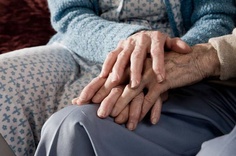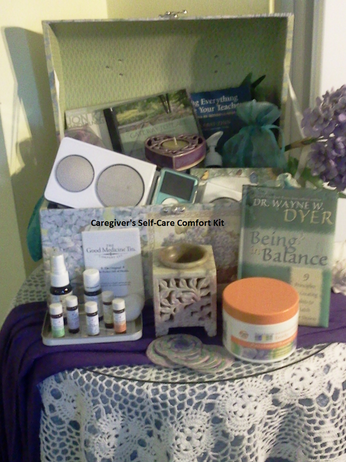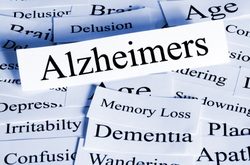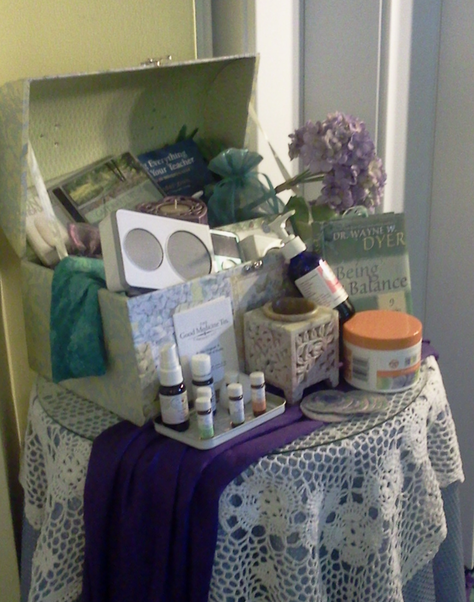|
2/15/2014 Love is Our True DestinyLove is our true destiny. We do not find the meaning of life by ourselves alone - we find it with another. ~Thomas Merton  I want to share with you a couple funny stories about my Mom in the nursing home. They are proof that love never dies and is our true destiny, as Thomas Merton attests. I arrived for a visit with Mom to find her sitting in the TV common area holding hands with the gentleman in the seat next to her. As I walked in and gave her a big hug and kiss, I asked how she was. She smiled a very sweet, slightly sly smile and glanced at the man beside her saying, "I'm doing fine. I've got a man!" I cracked up, since she was 91 at the time and because it reminded me so much of the Gershwin lyrics from the song I Got Rhythm: I've got my man, who could ask for anything more? She then expressed concern about whether I had a man of my own (I assured her quickly that I did, lest she suggest something I didn't want to contemplate). Mom and this very kind man continued to be good friends and companions until death parted them, and it always warmed my heart to see them holding hands and smiling at each other fondly. The second story happened earlier, soon after Mom arrived at the home and before she met her gentleman friend. I was at work, in a frantically busy office, when my cell phone vibrated, indicating a call from the nursing home. In a bit of a panic, fearing some kind of emergency, I grabbed the phone and rushed out to the parking lot to get a good signal, leaving a lobby full of people waiting, none too pleased about my disappearing act. The social worker from the nursing home quickly allayed my fears and then told me she had an "incident" to report. Well, that sounded pretty ominous. An incident? She further relayed that while waiting for the dining room to open, my mother had been sitting in a small alcove watching TV when another resident, a man, kissed her. I think I laughed out loud at this point feeling very relieved and repeated, incredulously, "Kissed her? Do you mean a peck on the cheek kind of kiss or were tongues involved?", I questioned. She assured me that it was fairly innocuous, according to her interview of the two people involved and witnesses. She further reported my Mom did not seem distressed at all by the kissing "incident" and indeed could not recall it. Well, I've had kisses that were less than memorable, but I suspected it was Mom's Alzheimer's causing this lack of recall. As I breathed a sigh of relief, I explained to the harried woman that I was not upset by this breach of manners, and actually, if this were the worst "incident" that ever happened that would be excellent. In fact, I continued, "My Mom may have even been the kiss-er instead of the kiss-ee, in this case, given her propensity for flirting." Sometimes you just have to look at the lighter side of life and love. With all the Valentine's Day hoopla yesterday so fresh in mind, it feels good to know that love can bring us joy at any age and in any circumstance. So get out there and hold hands with someone you love. And make your own kissing incident. Love is our destiny, indeed! 3/21/2013 Caregiver's Self-Care Comfort Kit"You give but little when you give of your possessions. It is when you give of yourself that you truly give." ~Kahlil Gibran  Caregiver's Self-Care Comfort Kit Caregivers are, by their very definition giving people. They do give of themselves, sometimes for many years, faithfully supporting their care-receiver. It turns out that most caregiving roles are more a marathon than a short sprint, so one has to be prepared with the strength and stamina to continue. Quite often caregivers find themselves battling their own chronic stress, burnout, depression, health problems, relationship challenges, and other negatives to quality of life. It is, therefore, of the utmost importance to find ways to reduce the stress, relax, disengage for a time of respite and renewal. I've spoken of this many times in the past year, even giving recommendations to create a Caregiver Comfort Drawer for those emergencies when you need a little extra TLC. However, in the previous posts, I didn't include a photo of the kinds of things I was recommending, and a photo is, as the saying goes, worth a thousand words. So, today, I am giving you a glimpse into my own self-care comfort kit, a photo tour, and a list of the types of things I included that worked for me. I realized, especially toward the end of my mother's life, that this comfort kit needed to be mobile, rather than in a drawer at home. That way, my visits to Mom could include pampering for us both. I hope you will find the suggestions helpful and that some of them will resonate with you. Please do find something to help you deal with the stress levels. It is not being self-indulgent to do so -- it may save your sanity, and perhaps even your very life! Here is a list of items my comfort kit contains, by category: Aromatherapy: Oil Lady Aromatherapy Good Medicine Tin, which includes 5 essential oils, pure organic jojoba to blend them, a lavender mist bottle, and instructions on how to use them in various ways, such as in a diffuser, in the shower/bath, in self-massage, hand massage, etc. These are simply wonderful in all kinds of situations, to calm & balance oneself and reduce stress. I give them my highest recommendation. They also sell a Sweet Sleep Kit with the lavender mist, and lavender oil, along with natural tranquilizer oil, which is great for those nights when sleep eludes you or your care-receiver. I also have a diffuser in my kit. Mine uses tea light candles, so must be attended at all times, but there are electric ones as well which can be set to low temperatures. In addition to the above, I also included Stimulator Oil and Balancer Oil blends from Oil Lady. I love them for myself and my Mom. Aura Cacia makes two great body creams that have become favorites -- Lavender and Patchouli/Orange are now my standards for moisturizing and make a pleasant bedtime ritual. And, I use some of their bath products when I want a special, relaxing treat. For more aromatherapy suggestions, visit my page: Aromatherapy Books & Music: For relaxation, I use a guided meditation called Gateway to Peace by Max Highstein. It is soothing music and words which takes you on a 12 minute journey of renewal. Great stress reducer! I also use Jon Kabat-Zinn's CD, Mindfulness for Beginners to learn mindfulness meditation. And, as a companion to that, the book Everything is Your Teacher, based on Kabat-Zinn's book, Full Catastrophe Living, offers great insights. I love Wayne Dyer's book Being in Balance which is quite helpful, and can be read in small increments if time is in short supply. There are many other books and recordings, and I find it most functional to put the music and meditations on an iPod for easy use and storage of a bunch of favorites. I bought an iHome speaker dock for it, which is rechargeable and has its own case for easy portability. That way, others, such as your care-receiver, can listen to, if you wish. I cannot emphasize to you enough the amazing power that music has to affect your mood and sense of well-being. It is a wonderful tool, for both you and your loved one, so please do make use of it in the ways you find most healing and helpful. Other items: A small journal/Gratitude journal Stationary and envelopes Colored pens, pencils, sketch pad Healthy snacks and not-so-healthy emergency chocolate (dark, of course, so I don't feel quite so guilty) You can get very creative with your comfort kit -- after all it is for YOU, so whatever speaks to your heart and soothes your soul is perfectly valid. I also advise using humor wherever possible and in whatever form you can find. It really will help keep life on the lighter side to have some laughter) 10/3/2012 Memory Cafes & Overnight Respite Care I've just been reading about these two concepts for Alzheimer's care, which frankly could completely change the face of caregiving for families dealing with this difficult disease. Given that one of the biggest problems for family caregivers caring for their loved one at home is isolation/depression, the chance to be with a group of other caregivers (and care receivers) in an enjoyable social setting provided by the Memory Cafe is a perfect boost to mental and emotional health. Even respite care, though very necessary, doesn't provide the same kind of supportive, warm, interactive environment in which to simply exchange conversation, ideas and enjoy the company of others who completely understand the challenges of the Alzheimer's journey. It benefits both the caregiver and receiver to have this type of socially stimulating environment. It is not a "support group" for caregivers, since the aim is not to provide education, problem solving, or information, but rather just to have fun! The concept for Memory Cafes is really beginning to catch on in England, and is now being actively advocated here in the US as well. The focus is on positive reinforcement among peers, laughter, food and simple pleasure in the company of others who are going through the same journey -- without any stigma attached. After all, other caregivers will be much more understanding of behaviors that might cause embarassment in a public setting. According to John T. McFadden, in an article written for the Alzheimer's Reading Room: A Reminder: Why We Need Memory Cafes, "Memory Cafes are, first and foremost, a setting in which persons with memory loss can share fun and laughter with their care partners and friends in a setting free from awkwardness and stigma." Speaking as a former caregiver, I think this is a truly wonderful idea, one whose time has come! Mr. McFadden has written a newly released book to champion the cause, titled, Aging Together: Dementia, Friendship, and Flourishing Communities. He and his wife are planning to visit existing Memory Cafes in England in order to refine a model for use in America. This is a concept we should most definitely support. It just makes sense to tap this important resource we have in each other -- our sense of friendship and community, which can be an invaluable help to those on the front lines of Alzheimer's. The second concept, which is new to me, but has been practiced at the Hebrew Home at Riverdale in New York for the past 10 years, is overnight care for dementia patients to allow caregivers a good night's rest at home. This innovative concept makes 24-hour use of the nursing home facility, to provide day care from 8:30am to 4 pm and overnight care from 7 pm to 7 am. The program creates a sort of party atmosphere for the participants, with music, marimbas, and dancing as well as singalongs, crafts, and therapy sessions that last till dawn. There is also provision made for those whose Alzheimer's may be more advanced, which includes soothing sounds, aromatherapy, massage and touch therapy. If you would like to read more about this, here's a link to an Associated Press article appearing in the Wall Street Journal, updated October 1, 2012, titled: Overnight dementia 'camp' allows caregivers rest. Because so many Alzheimer's patients are very wakeful and sometimes agitated at night (called Sundowning), it creates major problems for families when their sleep is disrupted night after night by this behavior. Again, from a personal experience perspective, this was the single most insurmountable problem for my family -- sleep deprivation for months on end. It errodes a person's health, sanity, and makes the demands of caregiving impossible to continue. It is a major complaint of Alzheimer's caregivers and one of the main reasons for institutionalizing their loved one. It doesn't have to be if there are more programs for overnight respite care developed around the country. It really makes perfect sense to use facilities around the clock (with different shifts of staff, obviously), so that families can rest and resume their care duties after a good night's sleep. I would love to hear your feedback on these two concepts and any personal stories you'd like to share about how your family is affected by these challenges of caregiving. Feel free to comment below. 7/31/2012 The Legacy Project: Wisdom capturedLife Philosophy: "I've learned that it's much easier to be positive than negative, it's easier to smile than to frown, and when in doubt, eat chocolate!" ~Anonymous Now that's a philosophy I can truly embrace :) This is a quote from an anonymous elderly person participating in a project at Cornell University called the Legacy Project. This project is a truly amazing collection of "lessons for living from the wisest Americans", created by Karl Pillemer, a professor of human development in the College of Human Ecology at Cornell University, and Professor of Gerontology in Medicine at the Weill Cornell Medical College. Begun in 2004, the project used a variety of methods to collect these nuggets of wisdom and life experience, including a pilot study, surveys and in-depth interviews. The project gathered over 1500 answers to the question, "What are the most important lessons you have learned over the course of your life?" According to the website, "People from across the country in their 70s and beyond shared their wisdom for living. The advice ranges from how to be happy on a day-to-day basis, the secrets to a successful marriage, tips on raising children, ways to have a fullfilling career, strategies for dealing with illness and loss, and how to grow old fearlessly and well." Grouped into categories, this wisdom is made available to any who wish to find some heart-warming, practical, and sometimes downright funny advice from America's elders. The best of the lessons have been complied into a book, 30 Lessons for Living, which has the distinction of being named "Best Self-Help Book of 2011" by Library Journal. Here's to the wisest Americans, a tribute of gratitude for their humor, grit and experience, and to Karl Pillemer for being the catalyst for sharing it with all. 5/14/2012 Laughter is the best medicine!OK, I know what you're thinking..."How can I possibly find humor when this illness is so serious?" I understand. There were times I felt that way, too. But, you know what? Lack of a sense of humor can, if not kill you, make you miserable enough to wish it did! As a caregiver, you have a lot of responsibility on your shoulders, whether you are dealing directly with a loved one's daily care, or doing it though others at a distance. Stress is stress, and it's basically bad for you in whatever form it takes. Humor can wipe stress out, and reset your whole being into a happier, calmer state, and make life a whole lot more liveable. Humor can help you avoid being sucked into seriousness over and over again until it feels like you are mired in quicksand and sinking deeper by the minute. Humor can actually be your lifeline and help preserve your sanity.
So, how, you say, do I get my dose of humor? Well, that's a highly individual and personal choice. There are many answers: funny movies, Erma Bombeck or other humorous columnist or author, a daily dose of humor via the internet, such as a joke a day, the comics in the newspaper (or virtual version) or a page a day calendar with funny sayings. Situational humor may appeal, such as watching a farce or, my own personal fave, Rowan Atkinson as Mr. Bean has me in stitches with his silent comedic talents. You may have your own favorite stand up comedian. Whatever makes you laugh is good! This isn't just my opinion, by the way, but has been documented through studies, reflecting the benefits of belly laughs. I actually often found humor in my mother's little habits and sayings. She would often repeat the poem, "Laugh and the world laughs with you, weep and you weep alone, they want full measure of your pleasure, but they do not want your woe." I guess if a saying had to be stuck in repeat mode, that was a good one to replay. After hearing that over and over, one day I happened upon a little wooden plaque that made a pun of this poem: "Laugh and the world laughs with you, snore and you sleep alone..." I hung this in a prominent spot where it brought a chuckle each time I glanced at it. Little doses of humor count, too. Be creative! So choose your brand of humor and start laughing your way to better health! |
About Karen
Karen is a compassionate, enthusiastic student of life, who cared for her mother for 17 years. She brings her insights, compassion, experience and desire to share knowledge and healing to this ongoing conversation with others on the caregiving path. If you are caring for a parent, spouse, friend or other loved one this site offers sanity-saving tips, open-hearted self-care ideas, and an open forum for discussion, connection and sharing resources for the journey. Archives
October 2021
CategoriesAll Acceptance Aging Together Alan Cohen Alive Inside Movie Alzheimer's Alzheimer's Prevention A Mind Of Your Own Anxiety Aromatherapy Audio Therapy For PTSD Austin Air Hepa Filter Autism Back Care Video Beginner's Mind Being Present Blessing For Caregivers Books Brain Insulin Butterfly Story Calm Calm.com App Care For Veterans Caregiver Advocate Caregiver Coalition Caregiver Comfort Kit Caregiver Guilt Caregiver Retreat Caregiver's Serenity Prayer Caregiver Stress Caregiver Support Care Giving Caregiving Vulnerability Care In Hospital Caterpillar Into Butterflies Chamomile Tea Cindy Laverty Comedian Computers & Exercise Crisis Dan Cohen Deepak Chopra Delirium Depression Diabetes Disaster Preparedness Distractions Dr. Dharma Singh Khalsa Dr. Oliver Sacks Eden Alternative Eldershire Elizabeth Dole Foundation Emergency Planning Emergency Preparation Emerson End Of Caregiving Enough Already Escapism Essential Oils Food Safety Forgiveness Funny Stories Gaiam.com Gail Sheehy Gift Of Alzheimer Gift Of Healing Presence GMO Food Green House Project Gregory Fricchione Md Grief Guilt Happy Light Healing Holding Hands Home As Sanctuary Hope Hospital Caregiving Hospital Stay Humor Inspirational Reading Ipods For Nursing Homes Isolation Jacksonville James E. Miller John Denver Johns Hopkins Study John T. McFadden Jon Kabat-Zinn Kelly Brogan Kirtan Kriya Meditation Lao Tzu Laugh Laughter Lavender Loneliness Loss Of Purpose Love Love In The Nursing Home Maya Angelou Mayo Clinic Mayo Clinic Alzheimer's Blog MD Meditation Meditation Garden Melatonin Memory Memory Cafe Military Caregiver Mindfulness Meditation Mr. Bean Music Music & Alzheimer Music And Memory Neurological Research Noise Pollution Operation Family Caregiver Opportunity Overnight Respite Care Pandemic Passages In Caregiving Patience Paul Coelho Peace Post-traumatic Stress Disorder Power Of Love Prayer PTSD Quality Of Sleep Radical Contentment Relaxation Releasing Problems Renewal Research Respite Rewind Rodney Yee Rosalynn Carter Rosalynn Carter Institute For Caregiving Rowan Atkinson Sanctuary Sanity Self Care Serenity Silence Sleep Slowing Time Solutions Soothing Music Stress Stress Relief Sun Sunshine Support For Caregivers Tai Chi Thanksgiving The Care Company The Kiss Time Traumatic Brain Injury Travel With Alzheimer's Person Treat VA Caregivers Valentine's Day Verilux Veteran Farms Veterans Veteran Suicide Vitamin D Wayne W. Dyer Wellness Wendell Berry White Noise William H. Thomas Worry Yoga Yoga Video |




